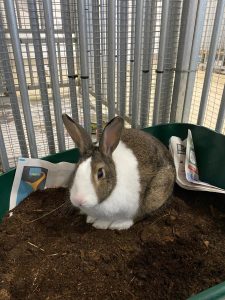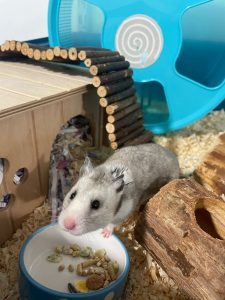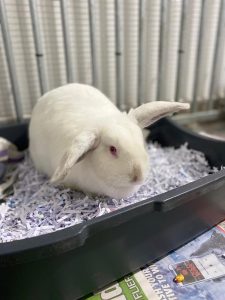Puppy dealers
Puppy dealers operate from the UK and Europe where they mass produce puppies especially the popular breeds. These dogs are kept in terrible conditions, it is cruel and the animal’s welfare is not a priority for these puppy dealers. They are very good at disguising the fact these puppies have come from awful conditions, they will set them up in a lovely home so that the buyer would never suspect the horrible things going on behind the scenes. You must walk away and not purchase these puppies. If you buy these puppies, you are supporting this trade and it will continue to grow. Walk away from the sale and report the dealer to the local authority.
Lucy’s Law
In April 2020, the UK Government introduced new legislation to ban the third-party sales of puppies. The Law is named after a Cavalier King Charles Spaniel called Lucy, who was rescued from a puppy farm where she was subjected to terrible conditions. Lucy’s Law means that anyone who wants to get a puppy in England must buy directly from a breeder or consider adopting from a rescue centre instead. Registered breeders must show the puppies interacting with their mothers in their place of birth. You can find out more about Lucy’s Law here: Lucy’s Law – What is it and who is affected? | Petplan | Petplan
How to spot a responsible breeder:
• Gives lots of information in their adverts about the puppies
• Is likely to have a waiting list for puppies
• Insists you meet your puppy before taking them home
• The puppies and their mom are kept in a clean and safe area in their home
• Will ask you lots of questions about why you want a puppy and this particular breed.
• Will expect you to ask lots of questions about the breeder and their puppies
• They should be able to give you their vet’s details so you can ask the vet questions and you can check their worming and vaccination status as well as any health tests the parents have had
• Will keep in touch after you’ve taken the puppy home – ask them if they are still in contact with previous litters
• It is a legal requirement to have the puppies microchipped
• You should meet the puppies and mum and see that they are obviously happy in the environment they are kept in
• Be happy for you to meet the parents of the puppies so that you can be sure of their temperament
• Understands the importance of and has started a socialisation program (see Puppy Socialisation (guidedogs.org.uk))
How to spot an irresponsible breeder or a puppy dealer:
• Not much information given in the adverts
• They say that they can get you any breed of puppy you want
• Won’t let you meet the puppy at their home before you purchase him/her and won’t let you meet the mother or the other puppies. Be wary of made up excuses
• Meets you in a public place or has the puppy dropped off at your house
• Doesn’t provide you with a vet’s contact details and hasn’t had the puppies wormed or vaccinated
• The same number will be used in a number of adverts, google the number and see if it has been used on other puppy adverts
• They use words like ‘miniature and ‘teacup’ in their adverts to get your attention
• The photos of the puppies may have been used on all of their adverts, right click the photo, select ‘search Google’ for image and see if it has been used in other adverts
• If the advert says the puppy is vaccinated, ask how old he puppy is, phone your vet to check if that is the right age for a puppy to already be vaccinated. If the puppy is too young, they are likely to be lying to you.
• If the puppy has a passport, it is likely to have been imported from Europe
• If the advert says Kennel Club registered, ask to check the original documents and check with the Kennel Club before buying the puppy
• Promises of free insurance and puppy packs does not mean it’s from a legitimate breeder
Why is it important to choose responsibly?
It’s important because the puppy dealers shouldn’t be supported. These puppies are more likely to grow up with behaviour and/or health problems which can be very difficult to live with. The puppy might leave the dealer and go on to live a happy life but their mother is not being looked after, she’ll be used purely for breeding, kept in awful conditions, not get any medical treatment or a chance to play or get cuddles from people. This is really a system that mustn’t be supported so, as difficult as it may be, if you suspect you are talking to a puppy farm, then walk away and report to
the local authorities.
Questions to ask a breeder
Be prepared to find out more about the breeder and their dogs. This is a suggested list of questions that you can ask them and the reasons behind why the question would be asked:
1. Did you breed the puppy? You should buy the puppy directly from the breeder or you won’t be able to meet the mother and see the place where the puppies were raised.
2. Are the puppies kept where they were bred? The puppies should still be in the place they were bred and raised and you should see this place.
3. How many puppies were there in the litter? This is good to know so that you can see the mother interacting with more than one puppy. Puppy dealers might use a home staged to look like the puppy was bred there where you can meet him, they might have a dog that they will claim is the mother but isn’t so watch how the mother dog interacts with the puppy.
4. Have any of the puppies or the mother had any health problems? It is best to buy healthy puppies from healthy mother.
5. Have the puppies been treated for worms or any other parasites? The puppies should have had parasite treatment, contact your vet before speaking to the breeder so that you have the information on what age the puppies should have received treatments.
6. Have or will the puppies be given their first vaccinations before they go to their new homes? Breeders can start the first vaccinations; contact your vet before speaking to the breeder so that you have the information on what age the puppies can start vaccinations.
7. Have the parents been screened for any inherited diseases known to be a problem in that breed? Have a look on for inherited diseases for each breed: http://cidd.discoveryspace.ca/breeds/overview.html Ask to see copies of the tests done on the parents.
8. Do the puppies have any form of identification, such as microchips? It is a legal requirement for all dogs in the UK to be microchipped.
9. Where are the puppies kept? Ideally, you want puppies that have been born in a home environment so that their socialisation to home living has already started, things like being used to people walking around, TV, washing machine sounds and vacuuming. This means they’ll settle into your home easier than a puppy born in other environments such as in a barn.
10. How has the breeder started socialising the puppies? Socialisation period starts at 2 weeks of age and the breeder should start introducing the puppies to a variety of stimuli so that they grow up to be confident, happy dogs. For socialisation advice, please see https://www.dogstrust.org.uk/dog-advice/puppy/puppy-socialisation-introduction
11. Ask where the breeder lives, is it a quiet or busy area? Has the puppy been exposed to noises such as traffic, television and household sounds such as washing machines and vacuum cleaners? Try find a breeder whose surroundings and home life matches your own so that the puppy has already learnt these things are normal and nothing to worry about.
12. Have the puppies met children? How old were the children and how did they handle the puppies? It is preferable that the puppies have met a variety of types of people, toddlers, children, young adults, older adults, teenagers and both genders so that they learn that people come in different shapes and sizes and are not scary. It is also important that the experiences are positive and
they haven’t been rough handled.
13. Have the puppies met adult dogs as well as their mother? It is preferable that the puppies have met other adult, healthy dogs so that they learn that dogs come in different shapes and sizes and are not scary. It is also important that these experiences have been positive.
14. Will you be able to meet all the puppies and their mother? It is advisable to meet all the puppies interacting with the mother. The mother should have a good temperament and have had the relevant health tests.
15. Will the puppies’ father be present? It won’t always be possible to meet the father of the puppies but it would be advisable to know his temperament and health status.
16. Ask if the breeder is in contact with the owners of previous litters and if you will be able to contact them once I have the puppy? A responsible breeder will care about their puppies and interested in how they are doing in their new homes, their temperament and their health. The breeder should say that if your circumstances change once you have the puppy that they will take the puppy back and they won’t need to go to a rehoming centre.





